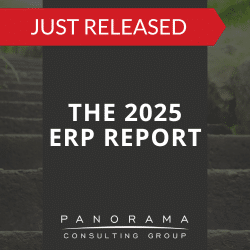What are ERP dashboards? They are views available within an ERP system that you can regularly access to view metrics and gain insights into key performance indicators.
Operational visibility is a chief reason why many organizations pursue an ERP implementation. Specifically, they want end-users to be able to access data with ease. In other words, as soon as a user logs in, they should be able to clearly see real-time data.
If you’re beginning ERP selection, it pays to know as much about dashboards as possible, so today, we’re breaking down the features to look for when evaluating ERP vendors.
The 2025 Top 10 ERP Systems Report
What vendors are you considering for your ERP implementation? This list is a helpful starting point.
What are ERP Dashboards?
ERP dashboards serve as the central interface of your system. They’re the first display that users see, and they contain critical information that is updated in real time.
The visibility requirements of each of your functional areas will differ. Your accounting team requires access to different data than your project management team, whose needs are separate from your HR manager’s. This is where role-based ERP dashboards come in.
In many cases, you can create, configure, and manage fully-centralized, custom dashboards for employees based on user roles. These dashboards require secure login access and use advanced encryption technologies to ensure users only see the insights that matter to them.
Let’s take a look at a few of the different role-based dashboards you can establish:
1. Sales
Your sales manager requires around-the-clock access to accurate, updated information related to team member performance. When they’re working off a data-rich ERP dashboard, they can quickly retrieve the information they need.
Some of the metrics they can glean in seconds (per salesperson) include:
- Number of open opportunities
- Average sales velocity
- Average number of sales
- Average number of days to close
- Win ratio
In addition to gaining employee-specific insights, they can also compare employee performance.
For instance, it’s easy to see who had the highest accrued commission or accrued sales in a particular month. Available in both graphical and numerical format, these insights can also be downloaded into report format to spur further team discussion.
2. Operations
Enterprise-wide operations can be exceedingly difficult to track. This is especially true if your supply chain is widespread.
A customized ERP dashboard streamlines supply chain management by allowing managers to monitor revenue, profits, and opportunities as they come in. With a few clicks, they can access financial data, such as gross profits, cash flow projections, and monthly revenues.
They can also review order and delivery trends, such as:
- Anticipated shipment times
- Volume shipped over time
- Average invoice amount
3. Accounting
While ERP software can benefit every department in your organization, arguably no employees will appreciate it more than your accounting team. Automating manual tasks such as bookkeeping, payroll, and tax compliance frees up these employees to work on high-value tasks and eliminates the risk of human error.
With a role-specific ERP dashboard, they can take a detailed, itemized look at your company’s inventory. This allows them to consistently monitor finances and expenses.
They can break this data down into segments, such as:
- Inventory received
- Inventory returned
- Inventory to ship
- Purchase suggestions
- Product warehouse origin
- Quantity to order
The ability to closely monitor this data can help your company optimize inventory management, while improving customer service levels.
5 Reasons ERP Dashboards are Worth Scrutinizing
As you compare ERP software vendors, you’ll reference your list of must-have requirements, as well as nice-to-have requirements.
Role-based ERP dashboards are a good example of a must-have requirement. Why are they so important? Consider for a moment that 65% of people around the world are visual learners. This means they retain information best when it’s presented in a format they can see.
Let’s review a few other reasons that dashboards are important, and thus, something you should scrutinize during the selection process in order to find the right dashboard functionality for your organization:
1. They Break Down Complex Data
ERP dashboards present important data to your employees in a format they can quickly scan and understand. Much of this data can be dense and highly technical in nature, but it’s less intimidating when it’s simplified and displayed in a graphical format.
When they can make sense of the insights in front of them, employees can clearly communicate team updates as they occur.
2. They Help Track Business Functions
It can be difficult to track team performance across your entire company, especially with so many different departments and business functions to consider.
With ERP dashboards, managers can easily see which areas are working and which need improvement. Without a dashboard, tracking down individual updates to make major business decisions could turn into a logistical nightmare.
3. They Encourage Team Action
Team meetings and emails can be effective, but sometimes, employees need to be compelled to take action. With ERP dashboards, employees can easily see what’s going on in their department and determine what next steps they need to take.
A dashboard displays more than lists of numbers. Dashboards are illustrative, bold, and graphical. In short, they’re storytelling elements.
While they don’t replace the need for communication and collaboration, they do an excellent job getting a message across loud and clear.
4. They are Flexible
If you just need a high-level overview, the key performance indicators (KPIs) displayed on ERP dashboards are easy to access. You can also drill into each indicator on a more granular level down to individual transactions. This built-in flexibility empowers faster, better-informed decision-making across your company.
5. They Streamline Business Intelligence and Reporting
Dashboards with real-time data are an essential component of a successful ERP implementation. These dashboards display accurate, up-to-the-minute data in graphs, charts, and other visual elements that you can share with team members across your organization.
With real-time metrics and scorecards, you can quickly access and analyze the performance of any business entity, including:
- Sales
- Finance
- Customer support
- Project management
- Warehouse
Being able to easily access this data allows you to make informed, agile decisions within your specific part of the business.
4 Considerations When Evaluating ERP Dashboards
As you compare different ERP dashboards, you’ll need to know how to score each one. Here are some of the top features to look for:
1. Customization
Dashboards should be easily customizable based on user roles. As we’ve discussed, this helps separate data by department and simplifies enterprise-wide data management,
In addition, it ensures that sensitive information doesn’t wind up in the wrong hands. Instead, employees only see the insights that are relevant to their roles and responsibilities.
2. Visual Elements
The best ERP dashboards display data in an engaging, visual format that’s easy for employees to use. Look for dashboards that include graphs, charts, tables, and diagrams. These elements might sound simple, but they can greatly improve user adoption and reduce change resistance.
3. Risk Management
An ERP dashboard doesn’t just tell you what’s going on in your business. It also alerts you to any risks, including potential failures to meet industry regulations. This allows you to stay on task without getting sidetracked by compliance issues or other setbacks that are easily avoidable.
4. Ease of Use
Though dashboards contain a vast well of information, they should also be simple and clean.
As you review dashboards, pay attention to how easy they are to use. The most advanced and complex dashboards could be rendered useless if your team members can’t easily customize or interpret them.
The Unsung Heroes of Your ERP System
What are ERP dashboards? Put simply, they’re the linchpin that makes your ERP implementation successful. Without the right dashboards, it can be difficult to monitor and track the data that flows through your company. You could also miss key deadlines, employee performance issues, and operational updates.
As you evaluate software, look for dashboards that are customizable, easy to use, and abounding in ERP real-time data. For assistance evaluating ERP solutions, reach out to our team of ERP consultants below.













